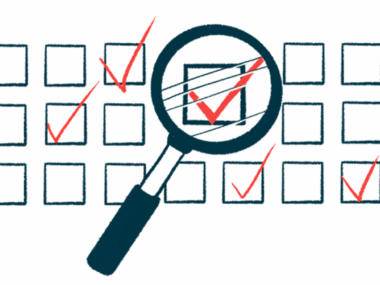When talking MG, pay attention to words, because they matter
Our challenge is to create a vocabulary rooted in science yet sensitive to others
Written by |

Living with myasthenia gravis (MG) has taught me that words are as important as medicine.
The language we use to describe illness can shape how others perceive us and how we view ourselves. Doctors have a vocabulary developed through years of education and experience, while our loved ones absorb vocabulary primarily through their interactions with us. Navigating MG without understanding its specific language can be challenging. Effective communication depends on a mutual understanding of language, which can lead to greater comprehension, lessened anxiety, and more healing.
Doctors attend to many patients, while our loved ones juggle multiple concerns and responsibilities. However, for patients, MG is a central focus in our lives. This reality compels us to learn the vocabulary related to MG and share this knowledge with our loved ones. When a physician told me, “You have bulbar weakness,” I nodded as if I understood. In truth, I felt, “I choke on coffee, slur my words, and can’t trust my own throat.” The gap between medical terms and lived experience can be significant; it’s in that gap that the language of illness is created. It was up to me to learn what bulbar weakness meant.
Doctors use words like “ptosis,” “dysphagia,” and “respiratory insufficiency.” While accurate and necessary, these terms can also feel alienating. In contrast, patients often describe their experiences in simpler, more direct terms: “My eyelid won’t stay open,” “I choke on pills,” and “I can’t get a full breath.” One language emphasizes precision; the other seeks recognition.
George Orwell warned, “If thought corrupts language, language can also corrupt thought.” In medicine, the risk isn’t corruption but disconnection. When the language is overly clinical, patients may feel unseen.
Reframing language
There is significant power in naming something. I remember the first time I heard the term “myasthenic crisis.” It sounded abstract, something that belonged in textbooks. But when I explained it to a friend, I said, “It felt like my body was shutting down.” Those words conveyed the fear and urgency I experienced.
In the Bible’s creation story, Adam names the animals, giving them identity. Naming an illness can bring clarity, provided the words resonate with reality. A label can offer comfort when it clarifies, but it can feel overwhelming when it becomes too burdensome.
Some terms associated with chronic illness can bruise the spirit. Being labeled “noncompliant” implies blame rather than recognizing the struggle. Being called “disabled” can feel reductive, as if that word erases everything else about a person. Even the phrase “chronic illness” can feel heavy, suggesting an endless burden.
In contrast, words like “resilient,” “fighter,” and “survivor” uplift. Proverbs reminds us: “Pleasant words are as a honeycomb, sweet to the soul, and health to the bones.” Reframing language can be an act of healing. I prefer to say, “I live with MG” rather than “I suffer from MG.” The former acknowledges the struggle but affirms dignity, while the latter focuses solely on pain.
In my 30 years as a teacher, I have seen how words can encourage or wound. Illness is no different. If a doctor calls me “stable,” I leave the office feeling relieved. If they say I’m “declining,” I walk out feeling heavier than when I entered.
Our challenge as individuals with MG is to create a shared vocabulary rooted in science yet sensitive to others. When explaining MG to students, I might say, “My muscles get tired faster than yours.” To family, I might explain, “Sometimes eating is harder than it looks.” When speaking with doctors, I revert to their terminology of acetylcholine receptors and neuromuscular junctions.
The poet Rainer Maria Rilke wrote, “The only journey is the one within.” Finding the right words for illness is an inward journey, seeking language that translates both pain and hope.
I’ll end with a bit of humor: Words can be fun. Playing with them can be entertaining. For example, is a CAT scan when you go looking for your feline friend? If you live to a very old age, did you dilate? Is benign what you’ll be after eight? Was seizure a Roman emperor? You get the point. Words matter.
Note: Myasthenia Gravis News is strictly a news and information website about the disease. It does not provide medical advice, diagnosis, or treatment. This content is not intended to be a substitute for professional medical advice, diagnosis, or treatment. Always seek the advice of your physician or other qualified health provider with any questions you may have regarding a medical condition. Never disregard professional medical advice or delay in seeking it because of something you have read on this website. The opinions expressed in this column are not those of Myasthenia Gravis News or its parent company, Bionews, and are intended to spark discussion about issues pertaining to myasthenia gravis.




Leave a comment
Fill in the required fields to post. Your email address will not be published.